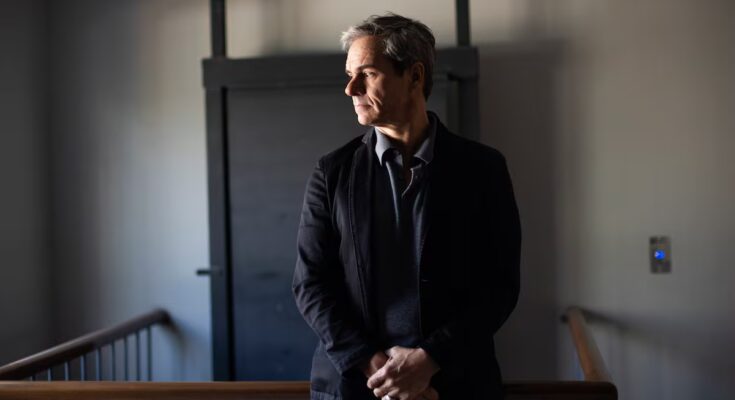Director Jorge Ramírez had a near-death experience a few years ago in Germany. During a stay to present a film at the Berlin Film Festival, upon arrival where he was staying he was attacked by some young people. He hit his head on the icy asphalt. Remember that it was February and the temperature was four degrees below zero. He couldn’t get up because he hurt his neck. A taxi driver saw him two hours later. It saved his life. He was hospitalized for six months, including three months in a wheelchair. He began to question his life, whether he would walk again, whether he would be able to film again or lead a normal life. It was during that time that he was able to read the novel The mutationsby Jorge Commensal. He found similarities in Raúl, his protagonist, despite the different situations that each of them went through. He decided to take it to the cinema and thus the adaptation of his new film was born, starring Tony Dalton, which he considers a metaphor for his own experience.
The mutations features Raúl (Dalton), a lawyer who must undergo emergency surgery for an aggressive tongue cancer that causes him to lose this muscular organ and his speech. This changes his life and his relationship with his wife and teenage children. Elodia (Mónica del Carmen), the domestic worker, gives him a talkative parrot that can only say leper things. The parrot becomes Raúl’s imaginary interlocutor and Elodia his sui generis nurse, who gives more importance to miraculous cures and prayers than to the possibilities of medicine.
Ramírez (56, Mexico City) admits that he had Dalton (50, Laredo —USA) in mind when he wrote the script. They had worked together before Love (2009), one of his previous films, and in the series The simulators (2008), a production in which he directed one episode. “Tony is always cast as the bad guy. I said, Tony can do something else. He has the talent to do something like that and it’s nice that he accepted. I’m really very happy with the level of acting that this cast and the parakeet have,” the director says smiling in the offices of the Mexican Academy of Cinematographic Arts and Sciences in the capital.
Dalton and Ramírez had several conversations to shape the character. Likewise, the protagonist had to lose weight gradually during the six weeks of filming to reflect Raúl’s state of health, as well as a “long and extensive” make-up process every day to see the deterioration caused by the cancer in layers. The forms of language and communication are two of the pillars that support the different situations that the character goes through, which represented a group challenge for the filming cast.
“I didn’t talk to many people during the filming. For this reason, Mr. Tanaka’s (Serguei Saldívar) photography and Jorge’s direction were a big factor in communicating what a character can say without speaking. So, it was a job to choose the shot, the environment, the camera placement to say what the main character can’t say with words. I think it was done very well,” explains Dalton alongside Ramírez.
The director states that the novel, Commensal’s first work translated into 10 languages, contains a profound reflection, analysis and a lot of information on what cancer is. These are some of the aspects that we tried to bring to the big screen, as well as elements of the screenwriter that help the character’s interpellation, such as the use of a baby monitor radio. Or the detail of the sisterhood that exists between women, in particular between the character of Elodia and Carmela, Raúl’s wife (Vicky Araico).
Outside of Mexico, some see Dalton and immediately think of Lalo Salamanca, one of television’s most memorable villains thanks to his participation in the series Better call Saulo. Even though he didn’t always have to play those types of characters, as in The killing ends (2004) or The simulatorsamong other film, television and theater productions, he believes that it is easy to fall into the stereotyping of certain roles or characters.
“I don’t think I play characters who are labeled as bad. Saying a character is bad sounds like a soap opera. All the characters have a justification for why they are who they are. Yes, it happens that you can be pigeonholed for certain roles. I have never had to be a character with this depth, a person fighting for his life, against cancer and trying to protect his family’s assets. I approach all the characters, on the one hand, where you try to understand what is happening to them, on the other hand because “They are suffering, or because they do not suffer. That’s what touched me about this film,” adds the actor.
Dalton says it’s a film that doesn’t take situations lightly. In this sense, Ramírez says that they were very careful in finding and curating the tone they were trying to give The mutations. They respected the vision of the novel, which is not a melodrama nor something tragic or strong, since at the same time it presents “nice situations”. The director admits that in almost all his films, even if dramatic or a thriller political, there is always a bit of a sense of humour, “because that’s life”.
“If we couldn’t laugh or get good things from life, we wouldn’t be human beings and in fact that’s why I also liked the novel. In this sense, the film is also very Mexican. Having a parakeet who says leperadas, for example, makes the film have a soundtrack with highs and lows. As Tony said, the tone of the film is very realistic. Trying to put each character in their place, contributing, illuminating this being who is experiencing a personal tragedy, but at the same time “Everyone else they are trying to do their part to adapt to a new reality,” says Ramírez.



